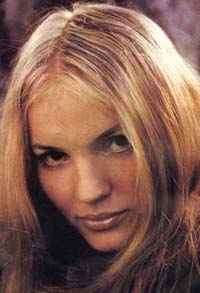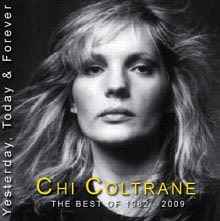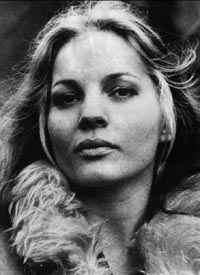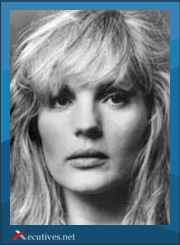Chi Coltrane started her music career as a pianist, singer and songwriter in Chicago, where she soon became famous. Her single, “Thunder and Lightning,” sold more than one million copies, and rocketed to the top of the charts as a certified huge hit. With her excellent voice she heralded as a rock legend since the early Seventies (“The first lady of Rock” and the “Queen of Rock”) after Janis Joplin, and she headlined on stage with artists and bands such as The Who, The Eagles, Stevie Wonder, and Rod Stewart. Chi Coltrane has just performed a big comeback concert in Vienna, where she played in front of about 100,000 people. Here you can read a fascinating interview with a rock legend, who has always gone her own way; a lady who has never been consumed by fame. Ms. Coltrane talks openly about her spiritual life, Michael Jackson’s death, Elvis Presley and life behind the music biz scene.
Dueblin: Ms. Coltrane, Michael Jackson’s death shocked people around the world. He was on the verge of performing a big comeback concert, just as you have done here for us in Austria; but the pressure of rehearsals and perfectionism seemed to have caught up with Jacko. What is it about too much early fame and enormous celebrity that makes people like Michael Jackson or Elvis Presley break down and suffer so much? What goes wrong with these talented, yet tragically vulnerable superstars?
Chi Coltrane: Well I would say in both these cases, if the reports were true, that it’s the sedative drugs, and too much medication which they took. I don’t think that it’s necessarily the pressure or the perfectionism that was the problem. I think a lot of people in the entertainment business take drugs to “feel good” and to “get high”. I don’t know if it was true or not; but Elvis and Michael reportedly took far too many drugs. They could always get what they wanted from doctors. In such situations, one doctor does not know from the other doctor what has already been prescribed. If the doctors do not give them the wanted drugs, such famous people simply change doctors. For people like Michael Jackson and Elvis Presley, all drugs are easily available. Again, I don’t know if these reports are true, but I am very sad about Michael’s death. He was such a talented performer. None of the doctors dealing with famous people should give drugs and medicine so indiscriminately just because somebody is famous.

Chi Coltrane (c) Chi Coltrane
Dueblin: But why do they so desperately want to have those drugs? People like Michael Jackson or Elvis Presley had the world in front of their feet. A normal and ordinary person might imagine that they could make every dream come true.
Chi Coltrane: Elvis and Michael both may have thought in the beginning that they could become fulfilled inside by becoming very famous. I met Elvis at an airport a long time ago. We were both waiting for our flight. I think he was working in Las Vegas at the time; and I think Las Vegas had a negative effect on him. He wore all those big diamonds and fancy costumes in Las Vegas. I felt sad when I saw this. He looked exhausted and not in good health when I saw him on television. Fame clearly does not fulfil anybody; neither does money. It is spiritual fulfilment that people should seek. Only spiritual fulfilment can give people real happiness. In my opinion you only can get it through a very real relationship with your creator. Institutionalized religion is not really going to satisfy you; and family and friends can only help to distract you from the lonely empty feelings in your heart; but this is not real fulfilment. I suspect that Michael had issues with his self esteem; and that he may have desperately needed people to approve of him. You remember when he displayed his child, holding it with one arm over the balcony of that building, high above the ground, and risked his child’s life; only to get the crowd’s approval? He wanted so very much to be loved, and I wonder if he suffered in his life from low self-esteem, even though he was so talented and skilled. Whatever it was; it destroyed his life. If it is true what his sister said about his father abusing him, IF this really happened; it makes me even more sad. I personally think that he was abused and exploited by people, especially by doctors who were performing excessive and disfiguring surgery on his face; and were prescribing him drugs and medicine; also people spreading “news” through exploitative, sensationalistic stories about his life, for their own financial gain.
Dueblin: Have you ever in your long term career been in contact with drugs, or felt abused or taken advantage of by studio managers or important people in the music business?
Chi Coltrane: I have definitely suffered abuse in the business and have been taken advantage of. I think it happens to everyone in this business; but I did not get involved with drugs due to the fact that I am spiritually fulfilled. People around me were doing lines of coke on my piano as well as doing other destructive drugs. Even though I have enjoyed world fame, and most all of the people around me took drugs and/or drank a lot; I have always refused drugs and alcohol. Some people respected that; other people couldn’t seem to understand it, but they accepted it.
Dueblin: What piece of advice would you give to people like Britney Spears or Amy Winehouse, two very skilled female musicians? Both became famous very young, and are extremely successful now, and yet apparently have had a lot of emotional problems, according to the tabloid press and papparazzi that follows them around and hounds them. What piece of advice would you give to them after such a long career in music business as you have enjoyed?
Chi Coltrane: I don’t think that the paparazzi is their problem. If they were to ask me for advice, (and only if they wanted it), I would advise them to completely get off of drugs and alcohol; and I would encourage them to look for spiritual fulfilment in the right place. That is not always easy and especially not for famous people like them; surrounded by lots of people, and their parasitic entourages, who are looking only to profit monetarily off of them. When you are looking for food, you look into the refrigerator, or you go to a grocery store to get something to eat. You do not go searching for food in the gutter. I would warn against deluding oneself into thinking that they could get fulfilment through fame. Fame is always going to let you down, sooner or later. It often causes famous people to feel depressed. I would also encourage them to avoid drugs and alcohol, because although at the beginning this may seem like an easy escape; it usually ends disastrously.
I think that what people want, whether they are famous (like Britney and Amy), or not; is something that fills the void in the human soul. People can feel this emptiness in their life, and only God, our creator can fill this emptiness; but that shouldn’t be confused with “religion”. There’s a big difference between knowing God personally or having a religion. Trusting in “religion” itself, is like putting a Band-Aid on a cancerous tumour and expecting it to heal. Religion is not able to fill this emptiness. I found glorious amazing peace and tremendous joy in my life that makes it easy for me to avoid drugs and alcohol, and gives me the energy to perform my music. Leonard Bernstein and Dusty Springfield each asked me independently of each other, from where I get my great peace; what was my spiritual source? Also, last week a famous disc jockey asked me the same question. I asked him how he knew about my peace, because I have never understood how people can see what I have inside; and he said, “It’s obvious; you emanate it”.

Chi Coltrane: CD Cover „Yesterday, Today & Forever“ (c) Chi Coltrane
Dueblin: You are called a Rock Legend (“The first lady of Rock” and the “Queen of Rock”) after Janis Joplin. Your music is very much influenced by blues, but also by gospel music. Your song “Go Like Elijah” seems to me a gospel song; I like it very much. What is it you get from the Blues and Gospel songs and somehow transmit through your songs?
Chi Coltrane: When I was a child, my main exposure to music was through my mother who played classical and jazz records. She didn’t like rock music, so I grew musically through jazz and classical roots, before I developed into rock. I guess it was Henri Mancini, Tchaikovsky and Johann Strauss who primarily influenced me; as well as Stephen Foster. I adore their music and their respective styles. Johann Strauss composed beautiful melodies, which I also adapted in my concerts. I used to play medleys from Strauss often removing the three-quarters time, playing it out-of-time; and people liked it very much. Rock finally became the expression of music I most loved. Certainly my rock style is full of blues elements, and also “soul” elements; but I don’t think that I have been influenced by gospel music; and “Go Like Elijah” was not written as a gospel song; I was just expressing my true feelings about death. You must remember that there was almost “zero” gospel music on the charts when I had a hit with “Go Like Elijah”. After I had chart success with “Go Like Elijah” and “Hallelujah” which are rock, and are not what was referred to as “gospel”; it was only after this that “gospel” music became more rock oriented and started to become popular on the radio; and I have been referred to as a “trail-blazer”. Blues music was very important in Chicago where I grew up, and where I started my career. I heard a lot of blues when I was a child. Many blues and jazz artists music was played in Chicago; for instance Nina Simone, Etta James, Cannonball Adderley and Ray Charles. They also inspired me.
Dueblin: A super star skater, Denise Biellmann, who won more than 10 world championships, recently said to me in an interview that everything is changing fast nowadays. There are less reliable stars anymore who appear steadily. I would say that it’s also like that in regards to the music business. What was probably different then back in the Seventies and Eighties when you had your first success?
Chi Coltrane: I think it is mainly the record business that has changed, and not only the artists. Especially in the Seventies you had very good music. Think about groups like “Supertramp”, “Queen”, “Pink Floyd”, “Led Zeppelin”, “Genesis”, or “Deep Purple”. These were fantastic groups, and made great music. Nowadays you have so many different kinds of music and so many categories and diversity from many different kinds of rap, to house and techno. It goes on very fast. This is also pushed by the industry. When you had a success in the Seventies and your next album wasn’t a big hit, you still got a third or a fourth chance to produce a hit. If you fail today, you are out of business. This puts a lot of pressure on younger talents. They must be more immediately successful in order to survive. It also causes them to concentrate more on trying to write a commercial hit instead of writing a great song. Some of the most famous groups I just mentioned from the earlier decades had no major hits on their first album. Their hits probably came in the second or third album. I would say some of those groups could not get famous under the current circumstances today. The record companies, in order to survive, try to avoid taking too many risks. This is the reason that lots of artists in the music and film business want to be independent, and make their own films and their own recordings in their own studio. I did it the same way. Some years ago I started with building my own studio in Los Angeles, where I am producing my next album.
Dueblin: One of your songs “I Will Not Dance” is very political; a song against war. In your opinion, is political engagement something that has changed in recent years in the music business and among artists?
Chi Coltrane: The Dixie Chicks and Joan Baez have recently made political statements; so have U2 with Bono. I don’t think musical political expression is as common today as it was in the ‘70’s, but it was very often disingenuous in the ‘70’s, and a lot of musicians did it because it was fashionable and “hip” to be anti-government and anti-establishment. Obviously, that was not the reason for all musicians, and I certainly don’t think that was the case with Bob Dylan; but many musicians just jumped on the band wagon. However, that’s not the case today. Today there are fewer artists making political statements, but they are genuine and I believe it comes from the heart, as with U2, for example. Many of them, like Bono, also “put their money where their mouth is”.
Dueblin: Has the music business become simply a superficial affair; a cash machine just to earn money?

Chi Coltrane (c) Chi Coltrane
Chi Coltrane: Well, consider that there are 3 aspects to the music business: the record companies; the musicians; and the fans. For record companies, the prominent goal has always been the money-making endeavour. That’s what they’re in it for; that’s why they’re in business. For some musicians also, it’s just to earn money; but not for all musicians, and certainly not for the fans.
Dueblin: Of course, this is not the first time you have been in Europe, especially in Switzerland, since you have been visiting our country for many years. Could you tell Xecutives.net what your view is of Switzerland? How would you describe Switzerland as a rock musician, visiting and playing countless gigs in Europe over decades, rather than as an ordinary tourist? What made you decide to live in Zurich early in the Nineties for a couple of years?
Chi Coltrane: I was in Switzerland in 91 and 92 because I had been touring in Europe in the late Eighties. I did a project with “Tangerine Dream” in the Nineties. Switzerland and Europe remind me of my European roots. My ancestors come from Germany. I met some wonderful people especially in Switzerland; in Basel and Zurich. They were very friendly to me, and also were a great audience. I have a lot of fans in Switzerland. I very much enjoyed the time I spent in Zürich and in Basel. It is interesting, that during all my touring in Europe, I would always come back to Switzerland between the tours. Then when I went back to Los Angeles to build my studio, I was at home in the United States. But this last time when I came back to Switzerland, I had this strange feeling, as if I were really coming home. I couldn’t understand why this was happening to me, and so I talked to my tour manager about this. I don’t understand these feelings, because my home is in Los Angeles (laughs).
Dueblin: You recently just had a great comeback concert in Vienna on June 27th, and played for about 100,000 people there. How was the concert? What is your next goal?
Chi Coltrane: The concert was fantastic. The audience was fantastic! I am doing a tour beginning in Eindhoven, the 30th of September, 2009. I have 8 concerts in Holland through the first half of October, and people can get all the information on my website at www.ChiColtrane.com. Then we are planning to make a tour through Austria in early 2010. I’m planning on touring all over Europe. Toward the end of 2010, I plan to work on my next CD in my studio in Los Angeles.
Dueblin: What do you wish for yourself, your family and your friends for the future?
Chi Coltrane: It is “Thunder And Lightning”, the title of the song I composed in the early Seventies. That is what I would like all of them to have, the same joy, peace and fulfilment that I have in my life. This is what I would have wished for Michael Jackson and for Elvis Presley because they were such talented artists.
Dueblin: Dear Ms Coltrane thank you very much for your time and this interview. I wish you all the best and lots of success on your concerts!
______________________________
Links
– Homepage
– „Go Like Elijah“ live on youtube
– Wikipedia







